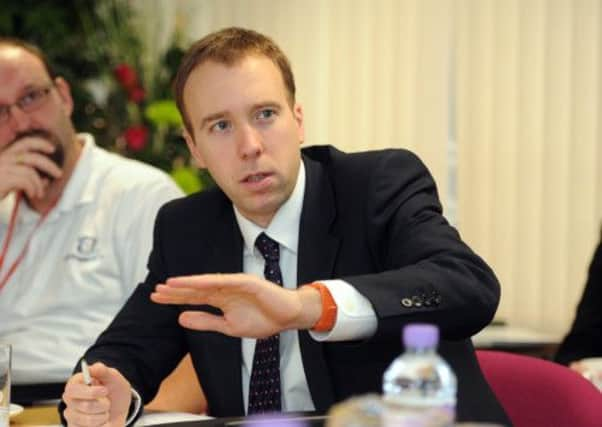HS2 to put young people on right track with training in new skills


Matt Hancock told the Yorkshire Post he agreed with the “principle” of using major contracts such as HS2 to offer new opportunities for young people, citing the precedent set by Crossrail, the £16bn rail link now under construction in London.
Earlier this year, Labour leader Ed Miliband called on the Government to use HS2 to create 33,000 new apprenticeships over the 20-year life of the project – one for every £1m spent.
Advertisement
Hide AdAdvertisement
Hide AdMr Hancock said his department has not yet started looking at how many apprenticeships might be created through HS2, but made clear the “policy” will be put in place.
“I’m always delighted when Labour endorse our policies, because this is the policy we have on Crossrail,” he said.
“Obviously we’re not at the stage of letting contracts for HS2 yet, but if you see that we’ve done this with Crossrail – and it seems to have worked – it’s obviously something that I’ll be looking at very closely.”
New figures released by Crossrail yesterday showed that nearly half the businesses winning work on the project are based outside of London and the South East.
Advertisement
Hide AdAdvertisement
Hide AdThey include Sheffield-based Romtech, which won a range of engineering contracts worth £10m, and East Yorkshire-based Servaccomm Redhall, which provided temporary accommodation for people working on the scheme.
However, Crossrail also said that only 400 apprenticeships in total will be created over the lifetime of the £16bn scheme – one for every £40m spent.
Mr Hancock said it was too early to talk about the numbers for HS2, but insisted: “There is a principle here, and the principle is embedded in the Crossrail contracts.”
All parties are agreed on the need to improve the quality of training available to young people who do not go to university.
Advertisement
Hide AdAdvertisement
Hide AdMr Miliband made “the forgotten 50 per cent” of young people who do not go on to higher education the focus of his much-vaunted party conference speech last year, and has spoken out repeatedly on the need for the Government to take swifter action to target youth unemployment.
But Mr Hancock said: “I thought it was very amusing that Ed Miliband wrote an article in the newspaper with seven suggestions on what to do on apprenticeships – we’re doing all of them.”
He added: “When Ed Miliband complains about the ‘forgotten 50 per cent’, it was the Labour government that forgot them.”
A series of events will be held across Yorkshire this week to promote the Government’s annual Apprenticeships Week, and figures released yesterday showed the number of people starting apprenticeships in Yorkshire rose from 36,500 in 2010 to more than 64,000 last year.
Advertisement
Hide AdAdvertisement
Hide AdThe Department for Business, Innovation and Skills said 85 per cent of people who undertake an apprenticeship end up in “continued employment”.
“The rapid growth in the number of apprenticeships over the last two or three years has been very impressive,” Mr Hancock said. “We’re getting the word out that apprenticeships are good value. They’re good for apprentices and good for businesses.
“In Yorkshire there are a huge amount of employers who say to us they need people who’ve got the skills to help them improve their businesses, and apprenticeships deliver that.”
Mr Hancock said he was “acutely aware” of the need to target skills training at key new industries such as the renewables sector in East Yorkshire.
Advertisement
Hide AdAdvertisement
Hide Ad“I was in Hull in January talking to both employers and training providers,” he said. “Here is an example of a big, fast-growing industry which really has the potential to turn round a city and a region. We’ve got to make sure the skills needs are taken care of, in the same way physical infrastructure is necessary.”